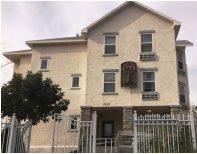El Paso, Texas, is home to a variety of supportive housing options aimed at providing stable and affordable accommodation to residents who need it most. These options include public housing, rental assistance programs, subsidized housing, and shelters for individuals and families with unique needs. In this article, we will discuss each of these categories and the government assistance they receive.
The Housing Authority of the City of El Paso (HACEP) provides publicly funded housing to low-income families, senior citizens, and disabled individuals who cannot afford private housing. This includes apartment communities and single-family residences. In addition to affordable rent, these communities may offer various social services to help residents improve their quality of life.
Public housing in El Paso is primarily funded by the U.S. Department of Housing and Urban Development (HUD). Residents typically pay 30% of their adjusted income in rent, with the remainder subsidized by federal funding.
For those who do not obtain public housing, there are rental assistance programs available in El Paso. The most notable is the Housing Choice Voucher Program (Section 8), which subsidizes a part of the rent for qualifying individuals and families, allowing them to afford private-sector apartments.
The Housing Authority distributes these vouchers, and the federal government provides the funds. Like public housing, those in the Section 8 program usually pay around 30% of their adjusted income on rent, with the rest covered by their voucher.
Low Income Housing Tax Credit (LIHTC) properties are another form of subsidized housing available in El Paso. Run by the Texas Department of Housing and Community Affairs (TDHCA), this program offers tax incentives to private developers to build and maintain affordable rental housing for low-income households.
Rent at these properties is capped at a percentage of the area median income to keep it affordable. The exact amount varies depending on the specifics of the property and the tenant’s income.
In addition to the general supportive housing options, El Paso offers a variety of specialized programs to individuals and families with unique needs. These include shelter services for homeless individuals and families, transitional housing for those escaping domestic violence, and group homes for individuals with disabilities.
Many of these programs receive federal funding through grant programs administered by HUD. Others are funded through state sources, such as the Department of State Health Services, or through private donations and grant funding.
El Paso, Texas, provides a range of supportive housing options to meet the needs of its residents. Whether through public housing, rental assistance or subsidized housing, individuals and families with low income can find affordable accommodation. Additionally, specialized programs ensure that those with unique circumstances have access to the shelter they need.
These programs rely heavily on federal and state subsidies, demonstrating the commitment of government bodies to tackle housing insecurity. It’s a joint effort—individuals, government agencies, private landlords, and community organizations working together to provide supportive housing solutions for all.

